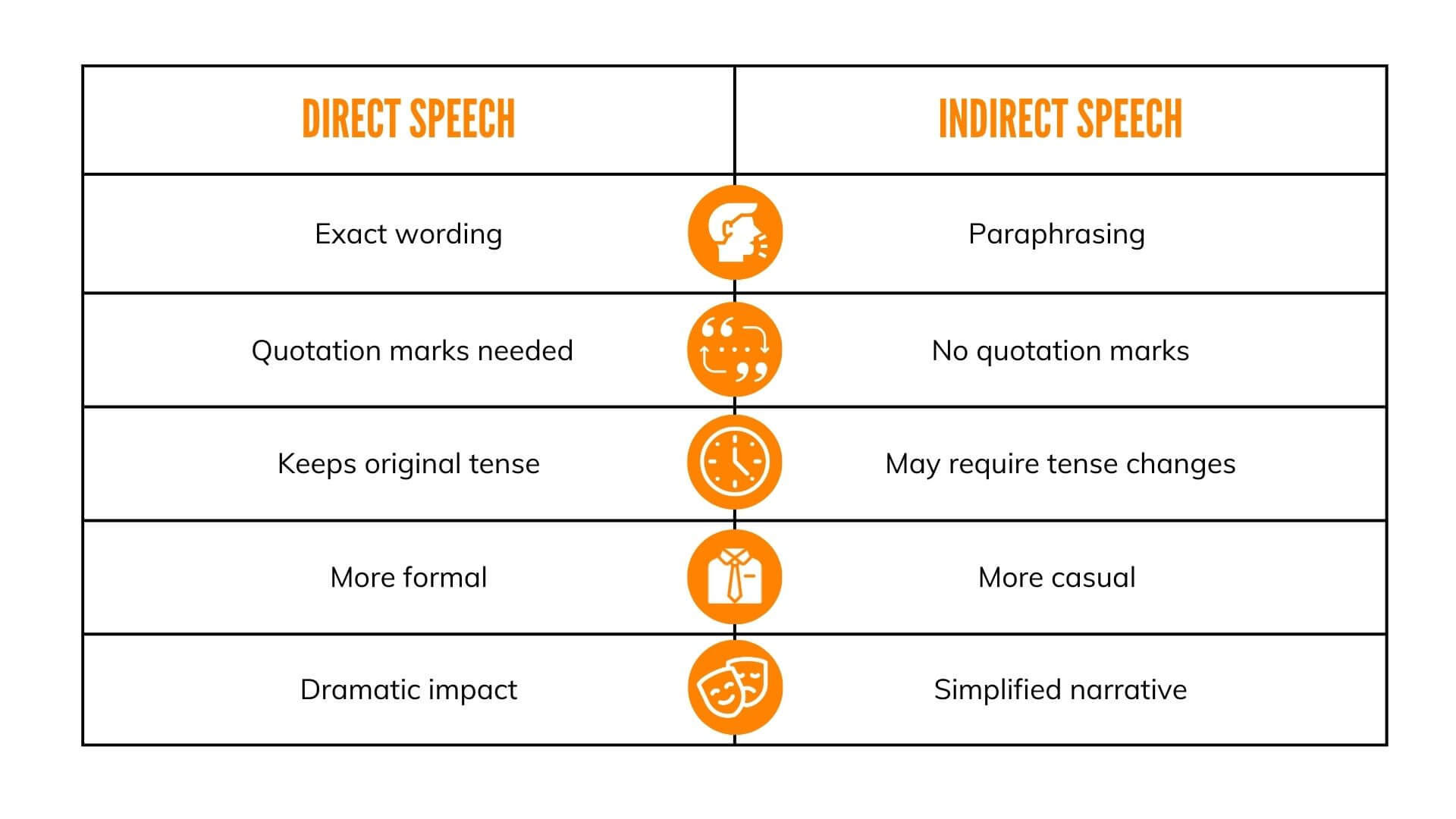
6 Amazing Reasons to Choose ES Dubai English School
Looking for the best English language school in Dubai to advance your career? Here are four compelling reasons that will make you choose to study and explore the city with ES Dubai!

Like our Post? Share Now!
Have you ever tried retelling a conversation and found it difficult to represent spoken words accurately? You’re not alone! Even the most seasoned English speakers often question how to quote someone else. Yet it’s something we do every day—relaying messages, narrating stories, or sharing gossip. Whether you wish to learn to speak English or improve your general English skills, you will come across the terms ‘direct speech’ and ‘indirect speech’. So, let’s unveil the mysteries behind these two ways of quoting people.
When you use direct speech, you repeat the speaker’s exact words. Direct speech usually comes with quotation marks to capture the exact phrasing someone used.
For example, let’s say your friend John tells you, “I love chocolate chip cookies.”
To quote John directly, you would write:
John said, “I love chocolate chip cookies.”
Notice the punctuation? The comma after ‘said’ and the full stop inside the quotation marks are essential when using direct speech.
1. Capturing exact words: If the wording is critical for context or impact.
2. Dramatic effect: When you want to create an engaging narrative or make a dialogue lively.
3. Legal or formal documents: When the exact wording can’t be altered for legal reasons.
Indirect speech, on the other hand, lets you paraphrase what someone has said. Think of it as retelling a story in your own words. You don’t have to worry about quotation marks, but you do need to keep the essence of the original statement.
For instance, if John says, “I love chocolate chip cookies,” you can report this indirectly as:
John said that he loves chocolate chip cookies.
Notice something? The verb ‘love’ changed to ‘loves.’ That’s because, often in indirect speech, you may need to adjust the tense and pronouns to match the flow of your sentence.
1. Simplification: When the original speech is complicated or hard to follow.
2. Summary: When you need to condense a long conversation.
3. Informal contexts: It’s less formal and more flexible, perfect for everyday conversations.

Okay, so you’ve got the basics. But this is English we’re talking about, and there are always exceptions and subtleties!
In the Case of Questions
– Direct: She asked, “Are you coming?”
– Indirect: She asked if you were coming.
In the Case of Commands
– Direct: He said, “Close the door.”
– Indirect: He asked you to close the door.
In the Case of Modals (Can, Could, Will, Would, etc.)
– Direct: “I can swim.”
– Indirect: She said she could swim.
Just remember, direct speech captures the exact words, while indirect speech gives you the freedom to paraphrase the same idea in your words. So next time you’re retelling that hilarious conversation you had with your friend or reporting important details from a meeting, you’ll know just how to do it!
Like what you read? We love to keep you updated about everything at ES. Check out our different courses, exciting facts about Dubai, news, updates, amazing success stories from us and much more.

Looking for the best English language school in Dubai to advance your career? Here are four compelling reasons that will make you choose to study and explore the city with ES Dubai!

The social side of ES Dubai! Discover our exciting activities, from sports like football and volleyball to fun-packed game nights, that make life at our English language school memorable.

IELTS is a recognised English language test used to prove your language proficiency to study, work or emigrate to any English-speaking countries. Learn more about the uses of IELTS scores!
We don't say that,
At ES Dubai, we make studying English a fun and fascinating experience for every student. A family-like atmosphere in a culturally diverse community at our school is our asset. Our school will become your second home while you learn, discover, and enjoy Dubai.

We offer full time and part time English courses to international students.
15th, 34th, 36th Floors BB1 Mazaya Business Avenue, JLT, Dubai, UAE
5th floor, UOWD Building, Dubai Knowledge Park, Dubai, UAE
15th, 34th, 36th Floors BB1 Mazaya Business Avenue, JLT, Dubai, UAE
5th floor, UOWD Building, Dubai Knowledge Park, Dubai, UAE
marketing@esdubai.com
+971 4 398 2815
+971 52 701 4480